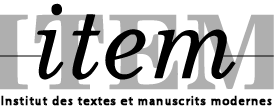01/01/2011
 Paolo D’Iorio, Michele Barbera, « Scholarsource: A Digital Infrastructure for the Humanities », in Thomas Bartscherer and Roderick Coover (eds.) Switching Codes. Thinking through New Technology in the Humanities and the Arts, Chicago, University of Chicago Press, 2011, pp. 61-87.
Paolo D’Iorio, Michele Barbera, « Scholarsource: A Digital Infrastructure for the Humanities », in Thomas Bartscherer and Roderick Coover (eds.) Switching Codes. Thinking through New Technology in the Humanities and the Arts, Chicago, University of Chicago Press, 2011, pp. 61-87.
Scholarsource
« A Skype Chat between a Philosopher and a Computer Scientist
P. is a middle-aged Oxford philosopher. He is a proper English gentleman, rather impractical, at times naïve, but erudite and thoughtful. He is fascinated by technology and wants to use it to resolve various problems in his field, while keeping a firm hand on the reins.
M. is a young, self-employed computer engineer of the Google generation. The son of prominent literary scholars, he has an innate affinity for the humanities but finds it all rather comically stuffy and inefficient.
Day One—Conditions of Possibility
P. Hello, are you there?
M. yup.
P. Glad I caught you. I’ve been meaning to ask you something. Do you think it’s possible to use the Internet and particularly the web for humanities scholarship? I mean not only accessing primary and secondary sources, as we scholars usually do in archives, libraries, and bookstores, but also publishing new work in ways that will stand the test of time and win prestige, as we’re always trying to do when we submit manuscripts to academic publishers, and educating younger generations, which is the mission of our universities.
M. lol. haven’t we been working on that for years? and not just us. remember that book u gave me back in y2k about the nietzsche project [D’Iorio 2000, 2007]?
P. True enough. But occasionally it is prudent to reconsider matters from the beginning, as we philosophers love to do… »
Switching Codes.
Half a century into the digital era, the profound impact of information technology on intellectual and cultural life is universally acknowledged but still poorly understood. The sheer complexity of the technology coupled with the rapid pace of change makes it increasingly difficult to establish common ground and to promote thoughtful discussion.
Responding to this challenge, Switching Codes brings together leading American and European scholars, scientists, and artists—including Charles Bernstein, Ian Foster, Bruno Latour, Alan Liu, and Richard Powers—to consider how the precipitous growth of digital information and its associated technologies are transforming the ways we think and act. Employing a wide range of forms, including essay, dialogue, short fiction, and game design, this book aims to model and foster discussion between IT specialists, who typically have scant training in the humanities or traditional arts, and scholars and artists, who often understand little about the technologies that are so radically transforming their fields. Switching Codes will be an indispensable volume for anyone seeking to understand the impact of digital technology on contemporary culture, including scientists, educators, policymakers, and artists, alike.












